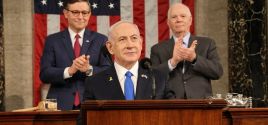U.S. cedes to Halliburton on costsNY TimesFeb. 27, 2006 |
Popular 
WATCH: New Film 'Atrocity Inc' Exposes How Israel Lied About October 7th to Justify Genocide

Trump Visits Lubavitcher Rebbe's Grave With Ben Shapiro for October 7th

Report: U.S. Offering Israel 'Compensation' to Moderate Iran Strikes

U.S. Spends Record $23 Billion On Israel Since Oct 7

FEMA Running Out of Funds for Hurricane Victims After DHS Allocates Record $454M to Secure 'Mostly Jewish Institutions'
 NEW YORK The U.S. Army has decided to reimburse a Halliburton subsidiary for nearly all of its costs on a disputed $2.41 billion no-bid contract to deliver fuel and repair oil equipment in Iraq, even though the Pentagon's own auditors had identified more than $250 million in charges as potentially excessive or unjustified. The army said in response to questions on Friday that the subsidiary, Kellogg, Brown & Root, had used questionable business practices in some instances and fallen short in its performance in others. But in the haste and peril of war, the army said, the company had largely done as well as could be expected. Aside from a few penalties, it said, the costs and additional fees would be paid in full. The Pentagon's Defense Contract Audit Agency had questioned $263 million in costs for fuel deliveries, pipeline repairs and other tasks that auditors said had been potentially inflated or unsupported by documentation. But the army decided to pay all but $10.1 million of those contested costs, which were mostly for trucking fuel from Kuwait and Turkey. That means that the army is withholding payment on just 3.8 percent of the charges questioned by the Pentagon audit agency, which is far below the rate at which the agency's recommendation are usually followed or sustained by the military. Figures provided by the audit agency on the rate at which such recommendations have been followed on thousands of military contracts over the past three years show the Halliburton rate is far below the norm. In 2003, the agency's figures show, the average rate was 66.4 percent, while in 2004 it was 75.2 percent and in 2005 it was 56.4 percent. Under the type of contract awarded to Halliburton, "the contractor is not required to perform perfectly to be entitled to reimbursement," said Rhonda James, a spokeswoman for the southwestern division of the U.S. Army Corps of Engineers, based in Dallas, where the contract is administered. The contract has been the subject of intense scrutiny since disclosures in 2003 that it had been awarded without competitive bidding. Congressional Democrats and others said that the company had benefited from its connection with Dick Cheney, who was Halliburton's chief executive before becoming vice president. Auditors later that year began focusing on the fuel deliveries under the contract, finding that the fuel transportation costs that the company was charging the army were in some cases nearly triple what others were charging to do the same job. Kellogg, Brown & Root, which has consistently maintained that its costs were justified, characterized the army's decision as an official repudiation of the criticisms. "Once all the facts were fully examined, it is clear, and now confirmed, that KBR performed this work appropriately per the client's direction and within the contract terms," Cathy Mann, a company spokeswoman, said in a written statement on the decision. The company's charges, she added, "were deemed properly incurred." Rick Barton, co-director of the post- conflict reconstruction project at the Center for Strategic and International Studies in Washington, said that despite the difficulties of doing business in a war zone, the low rate of recovery on such huge and widely disputed charges was hard to understand. "To think that it's near zero is ridiculous when you're talking these kinds of numbers," Barton said. In a written statement on the army's decision, Representative Henry Waxman, a California Democrat who is the ranking minority member of the Committee on Government Reform, said: "Halliburton gouged the taxpayer, government auditors caught the company red-handed, yet the Pentagon ignored the auditors and paid Halliburton hundreds of millions of dollars and a huge bonus. The disregard for the taxpayer is so flagrant it's almost impossible to believe." |



